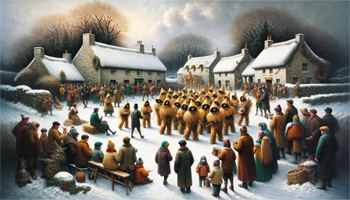 Saint Stephen's Day in Ireland
Saint Stephen's Day in Ireland


Saint Stephen's Day, celebrated on December 26th in Ireland, is an integral part of the Irish festive season. Known also as Wren Day, this holiday is steeped in history and tradition, and marks a continuation of the Christmas celebrations. While it may not be as widely known internationally as Saint Patrick's Day, Saint Stephen's Day holds a special place in the hearts of the Irish people. This article delves into the history, traditions, and modern-day celebrations of Saint Stephen's Day in Ireland, painting a picture of a festival rich in culture and community spirit.
Historical Significance of Saint Stephen's Day
The origins of Saint Stephen's Day date back to ancient times and are intertwined with both Christian and pagan traditions. Saint Stephen was one of the first deacons of the Christian church and was martyred for his faith, becoming Christianity's first martyr. In Ireland, the day has also been historically associated with the Wren Day tradition. The wren, considered the 'king of birds' in folklore, is central to this tradition. It was believed that capturing a wren and parading it through town would bring good luck for the coming year.
Traditional Celebrations: The Wren Day
The Wren Day, once widely celebrated across Ireland, involved groups of 'wrenboys' who would dress up in masks, straw suits, and colorful motley clothing. They would parade through the towns and villages, often with a captured wren (nowadays replaced with a fake wren) in a cage. As they paraded, they would stop at houses to sing, dance, and play music in exchange for small donations or treats. This tradition is a unique aspect of Irish heritage, combining elements of ancient rituals with Christian symbolism.
Modern Celebrations and Activities
In modern Ireland, while some aspects of the traditional Wren Day festivities have faded, Saint Stephen's Day remains a significant holiday. It is a public holiday, and many spend the day relaxing with family and friends, recovering from the Christmas Day festivities. In some parts of Ireland, particularly in rural areas, the Wren Day tradition continues, with parades and music sessions adding to the festive atmosphere.
Sporting events are also a common feature of Saint Stephen's Day in Ireland. The day is marked by various sporting fixtures, including horse racing and Gaelic football matches, which are popular attractions for many. These events provide an opportunity for community gathering and enjoyment, continuing the festive spirit of the season.
For many, Saint Stephen's Day is also a day for outdoor activities and enjoying the winter landscape. Families and friends often go for walks or hikes, embracing the beauty of the Irish countryside and the crisp winter air.
Saint Stephen's Day in Ireland is a blend of historical tradition and contemporary celebration. From the lively Wren Day festivities in some regions to the more subdued family gatherings and outdoor activities, the day is a continuation of the joy and togetherness that characterizes the Irish Christmas season. It's a day that reflects the rich tapestry of Irish culture and the strong sense of community that is so inherent to the Irish way of life. As part of the festive period, Saint Stephen's Day adds another layer to the warmth and celebration of the holiday season in Ireland.